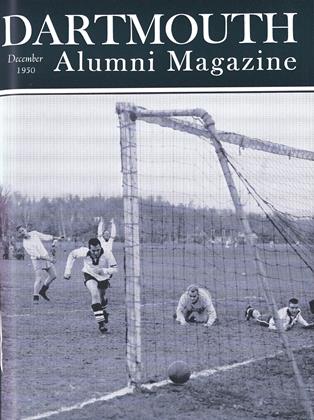In A COLLEGE of Dartmouth's present size, it is virtually impossible to have those occasions of close association bet ween the President and the entire undergraduate body such as existed in the days of compulsory chapel. There are, in fact, few chances these days for the entire College to share any sort of common experience, except perhaps at football games and other athletic events. The President does address the students and faculty at the opening of each college year, but Webster Hall holds only a little more than half of the student body and the rest must listen to a loudspeaker outdoors.
Modern circumstances call for modern devices, so President Dickey last month turned to the radio as a possible means of establishing an informal and direct line of communication with the undergraduates. In his first such talk over Station WDBS, late in the evening of Tuesday, November 7, President Dickey said, "The substantial good which I seek is a little better opportunity to get across to you as an individual Dartmouth student a few of the facts and considerations which can make your experience here a better and more meaningful one. It is a hard business at best for a fellow on this kind of a job to communicate with some 2800 students, each of whom is leading an exceedingly busy life and a life which in some measure is unique in its interests and problems from the lives of the 2800 other members of the student body. However, the College is one of those cooperative enterprises in life where men simply have got to to be able to communicate with each other if there is to be any common purpose and if they are to get anywhere in accomplishing that purpose."
President Dickey promised that in his talks he would try to touch on some of the broad basic aspects and problems of the College, without attempting "to run either a debate or a question-and-answer kind of program." He first took up the matter of Dartmouth's finances, explaining the relation of student fees to the whole problem, the part played by the Alumni Fund, and the prospect of a deficit for the current year.. For most of the student listeners the hard facts of the College's financial battle were brand-new information. In the final portion of his talk President Dickey dealt with "the tone of campus life at Dartmouth in these times." On the score of both self-interest and the representation they give to the College beyond Hanover, the students were shown the advantage of conducting themselves in such a way as to command the respect of people who will be judging them as gentlemen.
The first experimental broadcast of "The President Reports" is known to have drawn a large listening audience in the dorms and fraternity houses. One or two more broadcasts at intervals of approximately a month will be tried before the plan is evaluated from the point of view of both the President and the students. President Dickey has expressed his willingness to continue these talks if they prove of value to the College, and on many sides there seems to be a genuine desire that this new line of communication be developed and strengthened, mechanistic though it may be.
 View Full Issue
View Full Issue
More From This Issue
-
 Class Notes
Class Notes1918
December 1950 By ERNEST H. EARLEY, DONALD L. BARR, RICHARD A. HOLTON -
 Class Notes
Class Notes1935
December 1950 By HENRY R. BANKART JR., JOHN WALLACE, ROBERT w. NARAMORE -
 Class Notes
Class Notes1942
December 1950 By JAMES L. FARLEY, JOHN H. HARRIMAN, ADDISON L. WINSHIP II -
 Class Notes
Class Notes1923
December 1950 By TRUMAN T. METZEL, COLIN C. STEWART 3RD, LEON H. YOUNG JR -
 Class Notes
Class Notes1934
December 1950 By JOHN J. FOLEY, JOHN E. GILBERT, WILLIAM H. SCHERMAN -
 Article
ArticleContributions by Classes in the 1950 Alumni Fund Campaign
December 1950













